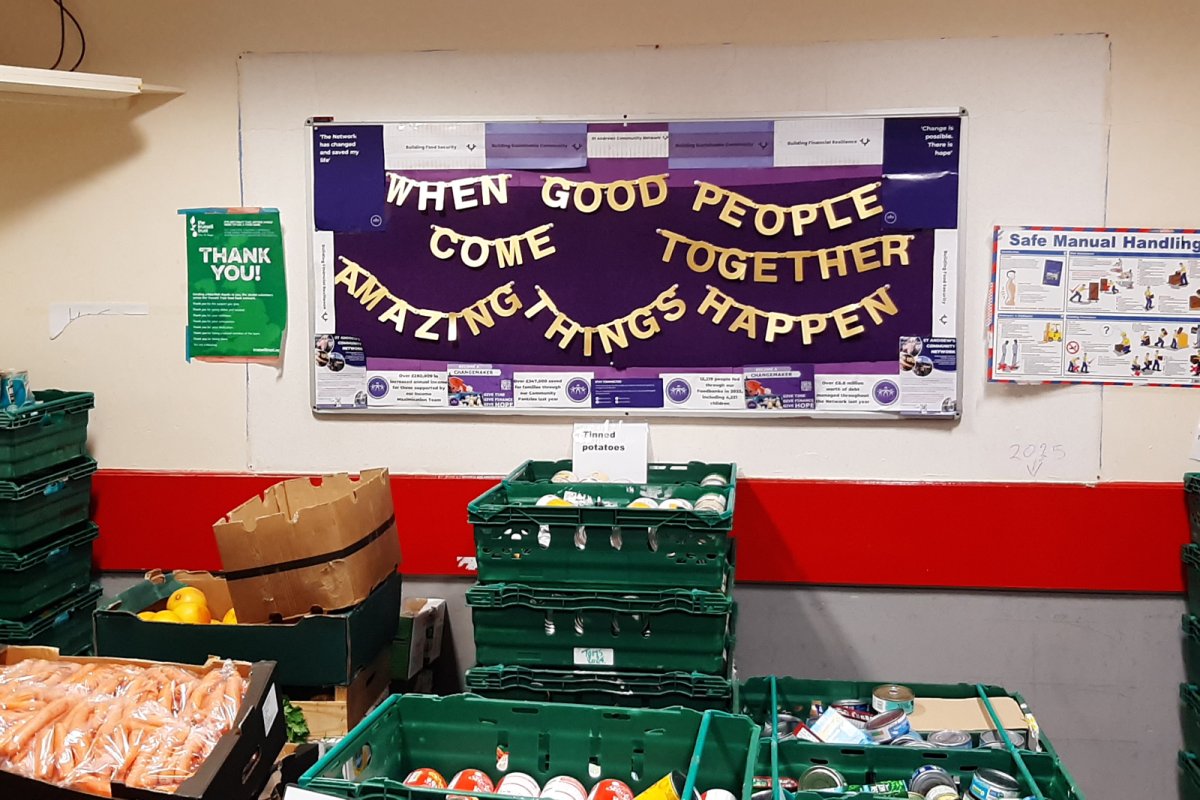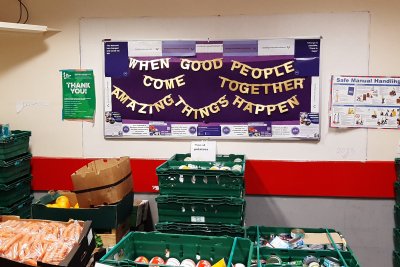 St Andrews Community Network Food Hub. Credit: Sofia Parente
St Andrews Community Network Food Hub. Credit: Sofia Parente
St. Andrew’s Community Network Food Hub
St. Andrew’s is a network of 11 Trussell Trust food banks and eight community food pantries, operating in the North of Liverpool. There has been little transition from food bank to food pantries, which is the issue they wish to explore.
Their mission is “Setting people free from the life affecting consequences of poverty by affecting locally rooted change from within”.
Business Model
Registered as a charity, St. Andrew’s supports seven franchised (Your Local Pantry) and one independent food pantry, plus 11 Trussell Trust food banks. The Network employs 21 people (FTE 14.2) and is supported by over 300 volunteers. Each food setting is run by 10-12 volunteers, and the organisation calculates that these volunteers give over 80,000 hours of time per year.
They are registered as a food business with the Environmental Health team at the city council, the food banks are audited annually by the Trussell Trust, and they hold the AQs standard for their debt advice work.
The food banks are Trussell Trust run, which means that they are by referral, and theoretically there are restrictions on the number of times someone can access support, however the current cost of living crisis is affecting the number of times people require support.
St. Andrew’s set up the pantries to offer an alternative to food banks and to encourage a transition from emergency food aid to models ‘up the food ladder’. They observed that attempting to engage people at food banks in support is difficult as when people are experiencing acute crisis, they may not feel able to cope with additional information beyond the need for food. The pantry model was developed to support a longer-term engagement opportunity, where advice can be sought and given in a calm space that also has a positive impact on mental health.
The pantries are mostly run on the Your Local Pantry franchise model. This model was developed ten years ago as a partnership between Church Action on Poverty and SKyLight (Stockport Homes Group). There are over 100 pantries in the network which runs on a membership basis - £3.50 per week subscription allows access to a choice of fresh and ambient food that is worth £20 to £25. Most pantries operate one day per week and serve as a social space where other support services can be accessed. The pantries tend to attract families who are working but on low incomes rather than welfare dependent, however the roll out of Universal Credit exacerbated the number of households seeking support.
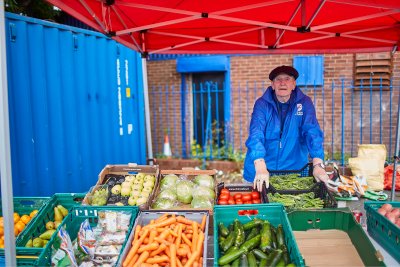
Additional services are available both through the food banks and the pantries, but St. Andrew's have noticed that pantry users are more receptive to additional support such as financial advice or food skills. St. Andrew’s sees this as a crucial reason why pantries should be supported and people directed towards them; as they are less stigmatising, and offer a respite and social space with many running informal cafés, this environment is more conducive to sharing of support services and advice. However, even the small membership fee required to join a pantry can be beyond the reach of many, meaning there is a possibility that they revert back to food bank usage, although they do not have data to demonstrate this. The pantries do have some data collection abilities, but these are minimal and this is a key area they would like support with.
Members and service users are invited to input their requests and comments via a feedback wall, which are taken into consideration. The pantries also offer a space for conversation and social congregation. Users of the pantries and food banks tend to be geographical in nature, so there is a wide variety of ages and other demographics. St. Andrew’s don’t target their services to any particular groups, but everyone is welcomed.
A pantry member at St Columba’s Kitchen said: “Shopping is so expensive now but here, you can get your bits, and they give you free items too, including lady products which as usually so expensive, they’re nearly five pounds! I’m a single mum so I’m really restricted in what I buy… It’s nice just to come and have a cup of tea. There are usually a couple of mums that come, so sometimes after you have done the school run and feel a bit like anxious or fed up, you come here and have a gab with people, over nothing in particular, just a chat and then you will go home and feel a bit ‘lighter’ – the power of a gab… When you are here, you can see things that are going on via the posters and flyers, so I’ll know what there is to do that I can bring the kids too as there is not always loads of things for us to do in the community.”
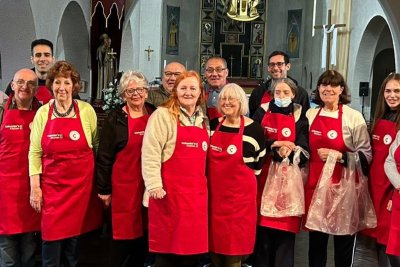
Food supply and logistics
St. Andrew’s have a centralised food hub in Clubmoor in the North of Liverpool, which they use to manage the logistics and food supplies for both types of operation. The food banks focus mostly on ambient foods that can take people through three days of emergency food supply. The pantries have their own additional suppliers, and purchase fresh fruit, vegetables, and meat for the pantries as this enables cost savings based on volume and provides a wider range of fresh products. These additional supplies are purchased from local providers Hurst Brothers, Total Produce and ADM meats, which were intentially chosen to support local businesses.
Food suppliers include HIS church, providing redistributed surplus food which varies in terms of quality and range; FareShare, whom they collect from rather than have deliveries to save costs, this can also be variable in quality and quantity. It has become more noticeable over past few years that surplus food supply is less reliable, so St. Andrew’s is exploring cooperative models of buying alongside peers within The Way Ahead group. Food is also received from supermarkets, wholesalers, retail outlets and volunteers. The pantries manage their own supplies but will donate into St. Andrew’s main hub any surplus they cannot use which is donated to food banks.
Clubmoor is the least diverse ward in Liverpool, but St. Andrew’s will try to access halal meat if requested. They also offer vegan and vegetarian options in both the food banks and food pantries.
Until recently St. Andrew’s rented two storage units in the centre of Liverpool to help with logistics of supply of ambient items. This is being downscaled to save money. At St. Andrew’s main hub there are rooms with fridges, freezers and shelving, it is a significant operation to manage and they are heavily reliant on volunteers. They also have two donated vans, used to collect food from FareShare and other spaces as well as delivery out to food projects. The running costs of the vans is not currently funded, but they enable the organisation to reach a wider organisation. They have no lease agreement in place for their current building, which adds to the stress of running the project.
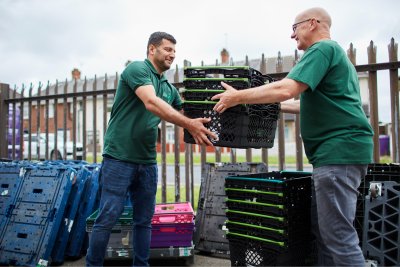
Funding and opportunities for social investment
St. Andrew’s has accessed additional funding and support via the Household Support Fund through the council and Feeding Liverpool. They are also supported financially by social investment from Torus, an affordable housing provider, who provide an annual grant as well as fuel vouchers.
St. Andrew's are also part of The Way Ahead group convened by Feeding Liverpool, which is exploring how different food aid and trade spaces can work together to maximise economies of scale and support each other in solidarity.
Costs for food supplies have risen 300% since 2020. This is reflective of the ongoing cost of living crisis and failure of welfare support and low wages to keep pace with inflation. St. Andrew’s is using their reserves from Covid grants and donations made but it is becoming an onerous burden to service. Food trade via the pantries does not cover the costs. On average £3.50 payment provides 10 items worth around £20. St. Andrew’s is covering the differential, but this is not a long-term sustainable model. Core costs are also not covered which means they have to fundraise to cover these. They are not currently undertaking other income-generating activities to subsidise the project, this would be challenges due to lack of resources.
Impact on the community
The St. Andrew’s projects have been supporting local people for over ten years. They meet people in crisis and are able to make a positive contribution to their mental health by addressing the issues of hunger and debt.
In the Financial Year 2022/23:
- The Foodbank network fed over 13,000 people including over 4,000 children. A third of these referrals came in the last quarter of the year.
- The Pantry network facilitated over 24,000 shops in the year saving members over £500,000.
They offer several ‘cash-first’ services which seek to maximise beneficiaries’ incomes:
- Their Money Angels programme is a new initiative training volunteers to signpost people they meet in the food spaces into the organisation for welfare benefits and debt advice. They trained 24 people in 2023.
- The debt team managed over £6 million in debts last year including writing off over £2 million worth of debt.
- The benefit maximisation team supported over 500 people last financial year increasing income by over £400k.
One of the Money Angels said: “I am retired so I got involved via a family member who also works here. I can guide people to the right place, it’s not about giving specialist advice, it’s about referring people on who are having issues with money management or debt.”
Challenges
The main challenges they report are the requirements to cover core costs e.g. van running costs, rentals, staff salaries, all while trying to meet the increased demand for their support. St. Andrew’s is managing at present but it is a long-term worry.
They also lack support to build their capacity e.g. exploring a cooperative model, being able to move people away from a culture of dependency, and improving data collection.
Future plans and aspirations
St. Andrew’s would like to reduce the size of their operation as that would indicate a reduced need for their services, but they are also aware it is hard to reduce in size once the organisation has grown, and while need remains high. They would like to develop a firm exit strategy but given the current high levels of need they are not sure what this would look like.
Top tips for others starting or running similar enterprises
- Keep it simple and consider the true cost of the service you are providing.
- Be consistent and have an exit strategy.
Feedback with Feeding Liverpool.
Feedback is a charity that focuses on sustainable food systems, we believe that securing nutritious, delicious food for all can and should go hand and hand with regenerating our planet. We run a Merseyside based project – Alchemic Kitchen – who advocate for access and education around sustainable food for all. We work closely with the food partnership Feeding Liverpool.
Good Food Enterprise: Working to provide food that is good for people and the planet, and support local production playing a part in community beyond trading.
Sustain
The Green House
244-254 Cambridge Heath Road
London E2 9DA
020 3559 6777
sustain@sustainweb.org
Sustain advocates food and agriculture policies and practices that enhance the health and welfare of people and animals, improve the working and living environment, promote equity and enrich society and culture.
© Sustain 2024
Registered charity (no. 1018643)
Data privacy & cookies
